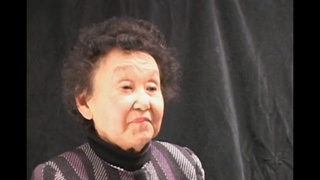Interviews
Don’t Make Waves
Well, I think I, actually I think it did a great deal for me. I mean, as I mentioned before, I was reluctant, I wanted to be all-American and you know, I just wanted to be a part of a society where I wasn't different or whatever. I mean, actually, we were kind of -- the WRA when we left camp, told us we should be unobtrusive. Don't make waves and all of this -- we were told this -- and don't congregate, so we, most of us, we were very quiet. And then we, well, like me, I was going to college and I tried to just keep my nose in the books and you know. So when I started to get involved and accept what had happened to me during the war, I became much more outspoken.
Date: September 11, 1997
Location: California, US
Interviewer: Becky Fukuda
Contributed by: Denshō: The Japanese American Legacy Project.
Explore More Videos

Memories of dusty conditions at Minidoka incarceration camp
(b. 1923) Nisei from Washington. Resisted draft during WWII.

Have compassion for all of humanity
(b. 1923) Nisei from Washington. Resisted draft during WWII.

Identity crisis (Spanish)
(b. 1969) Former president of Centro Nikkei Argentino.

Never sang Enka outside the family
(b. 1981) Enka Singer

Both Japanese and American identities though Japanese dance
(1918-2023) Nisei Japanese kabuki dancer

Family life in a Japanese Canadian internment camp in Slocan
(b. 1920) Incarcerated during World War II. Active member of the Japanese Canadian community


Results of being more American than Japanese
(1924-2018) Researcher, Activist

Trying to convey the meaning of the songs
(b. 1981) Enka Singer

Internship on a Native American reservation in Arizona
(b.1952) Master drummer, artistic director of the Taiko Center of the Pacific


Institutionalization as a bad aspect of camp
(1924-2018) Researcher, Activist

Different tension between East Coast and Los Angeles
Japanese American Creative designer living in Japan

Differences between American and Japanese taiko
(b.1943) Shin-issei grand master of taiko; founded San Francisco Taiko Dojo in 1968.

Meeting Japanese Americans from the mainland in MIS
(1923-2011) Lawyer, MIS veteran, founder of Francis and Sarah Sogi Foundation
